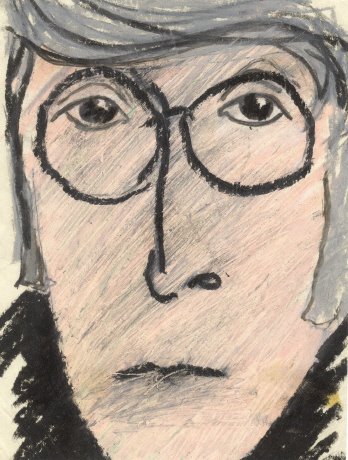 |
| John Lennon illustration by Mike Lormand (1984) |
"Whatever gets you through the night 'salright, 'salright
It's your money or life 'salright, 'salright”
-- John Lennon
It's your money or life 'salright, 'salright”
-- John Lennon
Obsessions, compulsions and addictions have always been in play. Now we see a somewhat new twist in driven behavior: In a time of plenty, many Americans seem to have become addicted to the act of choosing between this and that. This group has unwittingly developed what amounts to a jones for choosing from a smorgasbord of options.
Yet, as with any buzz, when it subsides the anxious feelings it allayed return with a vengeance. Thus, choice addicts find themselves living in a continuous loop of making choices in order to cope with their habit. This is beyond consuming, it's about choosing.
Of course Madison Avenue, the great facilitator of this shop-’til-you-drop scenario, has long depicted “choice” as utter bliss: Come and get 'em! These limited-edition widgets come in five, I say five, designer colors.
Choice has also been a hot political buzzword for some time. To a person wanting to express a belief that a woman is absolutely entitled to opt for an abortion, choice is a useful word for a slogan. It implies that ending the pregnancy is a matter of a person having dominion over her own body, rather than submitting to an authority claiming to represent society’s collective will. Of course, those calling for “choice” in this case see the individual’s right to choose an abortion as trumping whatever damage, if any, might be done to society by the abortion.
The notion that it should be fine for any citizen to pull his tax money out of the funding of public education, in order to finance sending his own child to private school, has been called “choice” by its advocates. While this argument appears to be resting on a convenient logic, it ignores the long-held American tenet that everyone in the community has a stake in public education, regardless of how many children they have.
In both cases, the sloganeers show a telling awareness of the lure the word “choice” has today. Perhaps this is due to some new collective sense of powerlessness in the air. Or maybe the scam aspect of selling folks their own freedom is as old as dirt.
In “One-Dimensional Man,” German-born philosopher Herbert Marcuse (1898-1979) warned us in the 1960s about illusions of freedom:
Free choice among a wide variety of goods and services does not signify freedom if these goods and services sustain social controls over a life of toil and fear.Marcuse’s keen eye saw the counterfeit aspect of the processed brand of freedom wielders of easy credit felt, even then, as they exercised their prerogative to select one set of time-payment obligations over another. Marcuse laughed at a man feeling free to choose between a new Ford or Chevrolet, then being chained to years of monthly payments. But Marcuse’s hard-nosed take on what he saw as controls over modern society is out of style today. Still, his view of how language is predictably used by a few of us to manipulate the rest of us remains as valuable as ever. Propaganda works better than ever.
French diplomat Charles Maurice de Talleyrand-Périgord’s (1754-1838) words on the topic of language remain crisp today. Talleyrand offered:
Speech was given to man to disguise his thoughts.British philosopher/mathematician Bertrand Russell (1872-1970) went further:
Speech was given to man to prevent thought.OK, so tricky lingo has long been used to shape perception. However, as a true believer in the unfettered streaming marketplace of ideas, I expect tortured language and agenda-driven slogans to come and go. My point is that the act of choosing should not be so highly valued that it comes at the expense of appreciating what happens after the choice is made.
Some folks put a lot of store in choosing the perfect mate. They shop and they shop. But from what I’ve seen, it's what couples do after their choice/commitment that has more to do with the success of the relationship than the perfection of the choice, itself. Of course, some just keep shopping, vows or not. They can’t stop shopping and choosing.
Can constantly switching TV channels for hours be a more satisfying experience than watching one interesting program? Well, the answer probably depends on whether you value what comes after the choice. After all, in order to be able to surf 200 channels, as opposed to only 50 or 100, customers gladly pay extra, although many of them never watch any program in its entirety.
Much of television’s most popular programming feeds its audience a steady flow of information about people who act as if they have genuine clout -- rich celebrities who cavort about with enough bread to buy anything. Then, quite conveniently, every few minutes, commercials interrupt the program to offer the viewer/schlemiel a chance to unjitter their jones by calling a phone number, or getting online.
Anytime your options are limited to what’s on a menu that was put together by someone else, by choosing from that prepared list you are surrendering some control to the list-maker.
And, the mountain of disposable schmidgets grows, evermore, as choice addicts cast off yesterday’s tarnished urge, to grab after today's sparkling urge ... just to get through the night.
-- 30 --

No comments:
Post a Comment